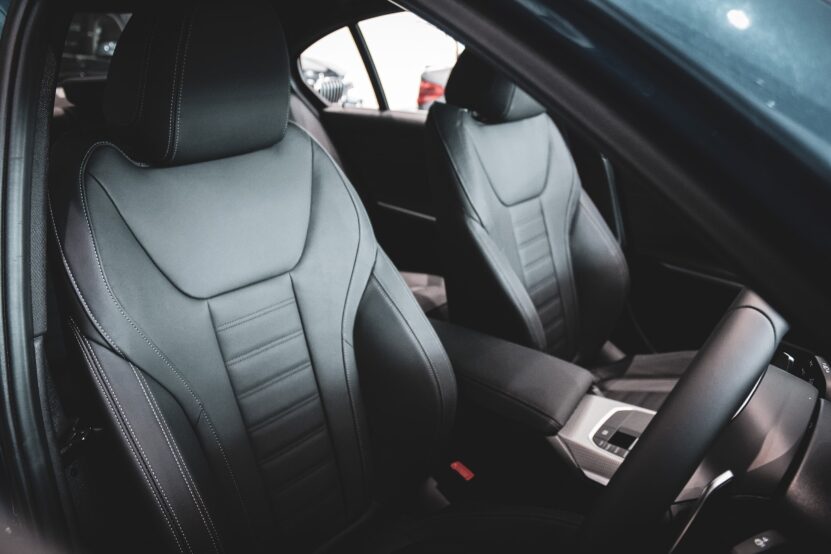The type of material used in car seats can make a big difference when it comes to comfort and style. While some people love the look and feel of leather or calfskin, others prefer more practical upholstery like polyester or vinyl.
Whatever your preference may be, understanding the benefits and drawbacks of different materials is essential for ensuring that you choose the best option for your needs.
In this guide, we will discuss five types of car seat materials – Alcantara, Leather, Vinyl, Polyester, and Nylon – to help you make an informed decision about which material is most suitable for your vehicle. We will explore their pros and cons so that you can make the right choice for your budget and lifestyle.
We’ll also answer some common questions about care requirements and how the materials hold up over time. Finally, we will take a look at how each type compares in terms of cost and overall value to provide you with all the information you need to make an informed decision.
Alcantara
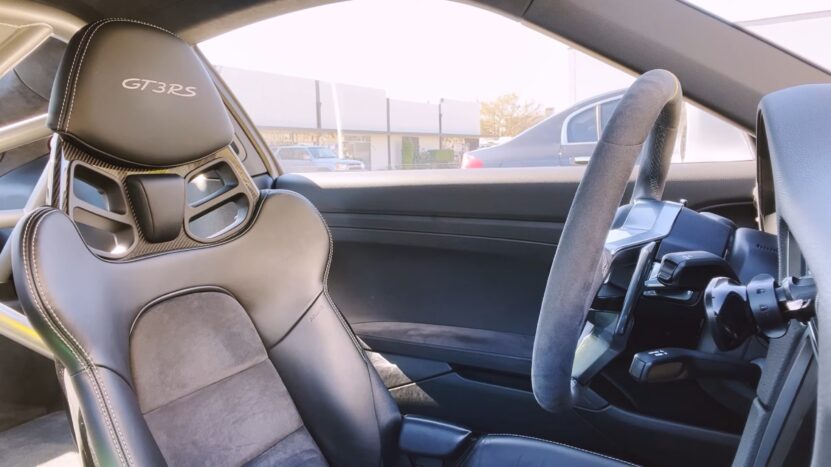
Alcantara is a synthetic material that mimics leather and suede, making it a popular car upholstery choice. This fabric is lightweight yet durable due to its tight weave, and it’s resistant to stains and fading. Because of its luxurious feel and look, Alcantara can be found in the car seats of luxury brands like BMW, Mercedes-Benz, and Audi. It is also a popular choice for aftermarket car seats.
Benefits
Alcantara, a synthetic microfiber material developed in the early 1970s, is quickly becoming one of the most popular alternatives to leather or cloth for car seats. It has a unique look and feels that is similar to suede, but it is much more resilient. Alcantara offers several benefits that make it an excellent choice for car owners looking for a luxurious interior experience. Pros:
- Alcantara is made of ultra-thin, tightly woven fibers that provide an incredibly soft feel similar to suede.
- It also resists staining and discoloring better than traditional fabrics and leathers, making it easier to care for overall.
- In addition, its breathable qualities keep drivers cool and comfortable even on hot days in the car because it doesn’t absorb as much heat as vinyl or leather.
- Alcantara can be customized easily with color, texture, and patterns so you can have seat upholstery that you won’t find anywhere else!
- Its durability makes it perfect for daily use while maintaining its new look far longer than some material alternatives.
Disadvantages
Alcantra is a luxurious and premium seating material but it does not come without its disadvantages. Although protected by special treatments, the fabric can still become soiled over time and may be challenging to clean.
Additionally, Alcantra is a relatively expensive option when compared to other materials, making it out of reach for some consumers. Lastly, due to its suede-like texture, Alcantra may provide less grip than other fabrics which could pose a risk to passengers during sudden braking or sharp turns.
Leather
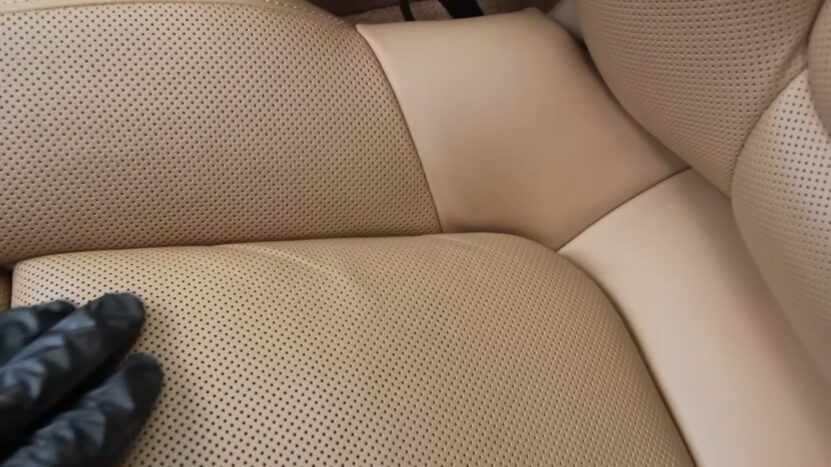
As one of the most popular materials used for car seats, leather is a high-quality material that is known for its durability, sophistication, and luxurious feel. Leather is available in a range of colors, making it easy to match your car’s interior, and offers superior comfort and breathability.
It is also relatively easy to clean and maintain, making it ideal for busy drivers who want to keep their cars looking great. Let’s explore the pros and cons of the leather car seat material.
Pros
Leather seating offers many benefits as a car seat material, not least being its design, style, and feel. Leather is a very smooth and strong natural material that with the right care, can be both expensive and long-lasting. It is also breathable compared to other materials, making it comfortable in all climates. Pros of leather upholstery:
- Durability: Leather can last for several years if properly cared for and protected from dirt, sweat, and spills from food or drink. It’s also water resistant if treated just after spills occur.
- Comfort: Natural leather does not attract dust or create static in contrast to synthetic fabrics which tend to become dusty quickly, leading to an uncomfortable ride for passengers.
- Cost: While genuine leather upgrades are typically more expensive than synthetic fabric options upfront, the durability of real leather means it is likely to last much longer than synthetic materials, saving you money in the long run.
- Easy Care & Maintenance: With more advances in technology due to its high demand, manufacturers are making cleaning and maintaining leather simple with “no fuss” protective coats that help fabric guard against any wear or discoloration occurring due to age.
- Aesthetics: Whether it’s classic black or bold color accents – the luxurious look of real leather upgrades any interior décor significantly compared to that of vinyl or polyester upholstery options.
Cons
Although leather car seats have many advantages, there are also some drawbacks to consider. Due to its high cost, it can be difficult for some drivers to incorporate leather seating into their car budget.
Leather also needs regular maintenance in order for it to look good and last a long time. Regular maintenance can include cleaning with special leather cleaners, removing dirt and debris with a soft brush or cloth, and conditioning the leather at least once a year. In addition, since the material is natural, it can be vulnerable to scratches and scrapes over time. If you’re looking for maximum protection against stains and spills, you may want to choose a different type of car seat material such as vinyl or polyester.
Finally, if you live in a hot climate where the temperature reaches high levels during summer days, leather seats may be overly warm and uncomfortable due to heat absorption.
Vinyl
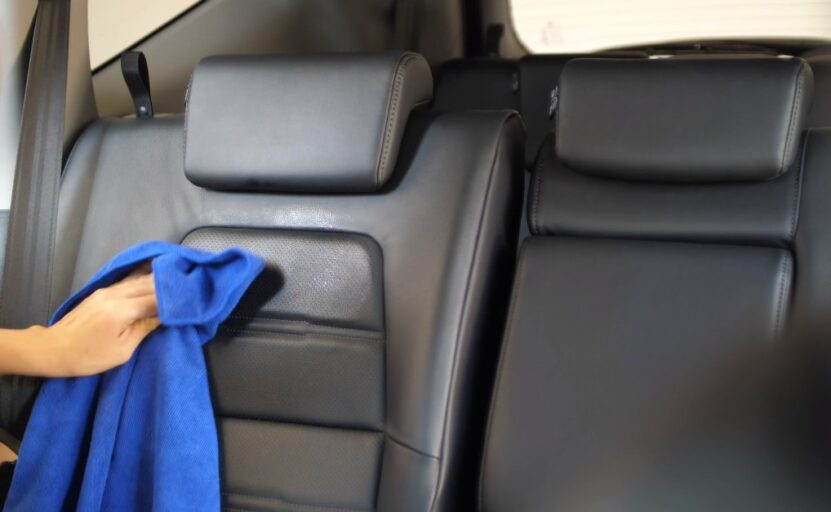
Vinyl is a popular choice among car seat material options due to its durability and strength. Vinyl is a synthetic material that is water-resistant and easy to clean. It is also available in different colors and patterns, so you can find one that best suits your needs and tastes.
Let’s take a closer look at the pros, cons, and other considerations of using vinyl as your car seat material.
Advantages
Vinyl is synthetic leather made from polyvinyl chloride (PVC). It is usually a more affordable option than leather as its production does not require any animal hide and is compared to plastic material. Compared to upholstered materials, vinyl is more water-resistant and is relatively easy to clean. Pros of using vinyl for car seat covers include:
- Resilience: Vinyl car seats are resilient, they can last many years with proper maintenance and care. They are also easy to clean, which means you can keep them looking great for years.
- Low Maintenance: Since vinyl car seat covers are waterproof and stain-resistant, they don’t require much in terms of regular upkeep or maintenance.
- Cost Effective: Vinyl car seat covers cost less than leather or upholstery options, making it an affordable material in the long run.
Factors to consider
Vinyl is a synthetic, man-made material that is frequently used as an alternative to leather or fabric. It is waterproof and extremely durable, making it a great choice for long-term use in a vehicle.
However, one of the main disadvantages of using vinyl is that it may be difficult to clean if it becomes soiled due to dye transfer from clothing or other materials. Additionally, vinyl does not have the same luxurious look as leather and can easily show wear and tear over time. Furthermore, the lack of breathability in vinyl makes it a less comfortable option compared to natural fibers such as cotton.
Polyester
Polyester is a popular car seat material because it is affordable, breathable, and durable. It is also lightweight and easy to maintain. It is resistant to fading, stretching, and abrasion, and comes in many different colors. Polyester is also soft to the touch and can be easily cleaned with mild soap and water. Let’s dive into some of the other benefits and drawbacks of polyester for car seats.
Pros
Polyester is a synthetic material made by melting plastic pellets and then forced through a spinneret, a small hole. It can be found in both woven and non-woven forms like microfiber, suede, twill, and many other various blends. Polyester fabrics are known for their tensile strength, wrinkle resistance, and colorfastness.
This material is very easy to care for as it is resistant to most moths, mildew, abrasion, and shrinkage. In addition to this, polyester fabric does not absorb moisture which can make it much lighter than fabrics such as cotton or wool. As a result of this great combination of properties in both looks and performance, it makes the perfect material for car seats.
The properties that make polyester so attractive also double up to benefit vehicle owners who opt to use this fabric on their car seats. Pros include:
- Ease of Cleaning: Polyester fabric is one of the easiest fabrics to clean since its composites repel moisture and dirt buildup. This means that regular wiping or vacuuming should be enough most times, though lightly spotting cleaning with soapy water may sometimes be needed.
- Price Factor: Polyester cloth is often more reasonably priced than other materials used on car seating such as leather or Alcantara due to its synthetic nature
- Durability & Strength: Compared with some natural fabrics such as cotton and wool, polyesters are significantly stronger which makes them suitable in vehicles that may experience more wear such as those used for family trips, etc.
Cons
While polyester is economical and available in many colors, it’s not the best choice for car seats for several reasons.
One is that it can be difficult to maintain over time; polyester tends to attract odors like smoke or fast food, so keeping the car clean will become more important as the fabric ages. In addition, polyester doesn’t breathe very well—meaning if you live in a really hot area you’ll likely find yourself sweating in your seats during summer months.
Some people find polyester fabric uncomfortable or too slick after long drives due to its tendency to retain body heat; it also may not provide enough cushioning support.
Nylon
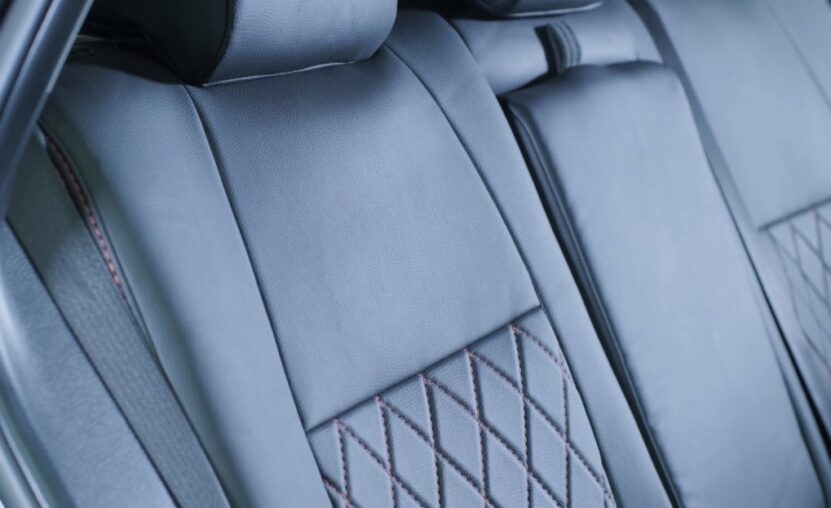
Nylon is one of the most popular materials for car seats. It is a durable and cost-effective option for upholstery, offering great comfort and support for passengers. Nylon is a synthetic fabric, so it is resistant to stains and durable enough to last for years. Additionally, nylon is relatively easy to clean, making it a great choice for those on a budget. Let’s look at the pros and cons of nylon car seats in more detail.
Benefits
Nylon is a popular material for car seats because of its affordability and ability to withstand wear and tear. Nylon is lightweight, so not only does it add minimal weight to the vehicle, it’s also easier on fuel economy.
It also tends to be more durable than some of the other materials used in car seats. Nylon is resistant to tearing and fading, and since it requires little maintenance, it’s an ideal material – both economically and environmentally – for consumers looking to save money on luxury items.
In addition, nylon can be easily dyed to create any look you desire. Nylon seats provide a comfortable ride owing to their ingenious design that doesn’t cause any discomfort while driving or sitting with them in the car for long periods of time. Additionally, some types of nylon can provide much-needed insulation during winter months.
Challenges
Nylon is one of the more popular materials used for car seats. It’s strong and durable and can provide a range of colors and textures to complement just about any interior.
However, while it has its advantages, there are also a few drawbacks that you should consider before you choose to go with a nylon car seat cover:
- It’s difficult to clean. Nylon is not very stain resistant, so spilled liquids can easily penetrate the fabric and require specialized cleaning solutions or professional steam cleaners in order to remove them.
- It doesn’t last as long as some of the other materials. If exposed to direct sunlight or high temperatures, nylon has a tendency to fade or crack over time.
- In hot climates, it can be uncomfortably warm against bare skin.
- Airing out after sitting can be particularly hard with nylon material since air circulates through it more slowly than other fabrics like leather and Alcantara.
FAQs

Which car seat material is best for families with children?
Fabric car seat material is a good option for families with children because it is easy to clean and maintain.
Which is best for hot climates?
Vinyl is a good option for hot climates because it does not absorb heat like leather or fabric.
Which material is best for luxury vehicles?
Leather and Alcantara are both good options for luxury vehicles because of their premium feel and durability.
Which car seat material is best for sports cars?
Alcantara is a popular choice for sports cars because of its luxurious feel and ability to hold the driver in place during high-speed maneuvers.
How often should they be cleaned and maintained?
They should be cleaned and maintained regularly to prevent stains and wear and tear. The frequency of cleaning and maintenance depends on the type of material and how frequently the vehicle is used.
Before you go, find out how to properly wash seat belts.
Conclusion
At the end of the day, choosing the right materials for your car seat depends on what type of look and feel you want in your vehicle. Each material has its own unique characteristics – it just comes down to weighing up which specific qualities you value most. Alcantara adds a luxurious and stylish feel, while vinyl maintains a more classic aesthetic.
Leather is always a popular choice, while polyester provides durability. Nylon is comfortable and lightweight. All of these materials offer something different, so consider what properties are most important to you before making your final decision.

